JJ Abrams Star Trek Interview
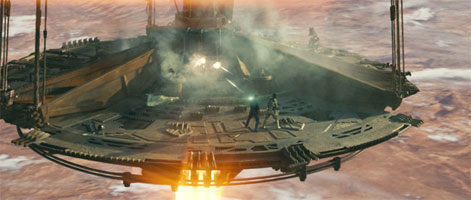
JJ TAKES ON A SOARING FRANCHISE.
JJ Abrams, Star Trek Interview by Paul Fischer.JJ Abrams has created some of TV's most successful shows, from Felicity, to the compelling Alias, Lost and recently, Fringe. So it was inevitable that he would take the leap to the big screen, first with the last in the Mission:Impossible franchise, and now helming the risky reboot of the iconic Star Trek. The gamble has paid off, with the film already receiving early buzz. The once non-Trek fan has clearly gone where no director has gone before. He spoke to Paul Fischer.
QUESTION: JJ you really took it on yourself to take on one of the most beloved franchises, probably in the history of television and I'm just wondering, first of all, why you felt so compelled to do this - and why now, in the year 2009, is it the right time to revisit this world?
JJ ABRAMS: I think that the embarrassing truth is that because I was not a Star Trek fan, my initial reaction when they asked if I'd be interested in producing was, "Oh, that would be cool, to try and work on a version that did appeal to me." I immediately called Alex and Bob. And they had already been talking to Paramount about Star Trek, and they were trying to figure out how to do it. And Alex and Bob and Brian and Damon Lindeloff, who couldn't be here today - he's doing a Lost thing in France - we all got together and started talking about what Star Trek could be, for now. And because I was not a huge fan, because Brian had never seen an episode, and because Bob and Alex were big fans, and Damon as well, we had a range of sort of relationships with Star Trek. And the key was to find a story that we all embraced. And again, you know, knowing that Star Trek inherently was an optimistic story - it told a future that was about collaboration, about survival, about working together across cultural and political and racial lines, and special lines - and the idea that we wanted to maintain that, spoke to the tone of the movie. And - which is to say that there have been many films in recent years, many of which we have all loved, that have depicted a very dark, dismal, cynical, grim future. And that's not what Roddenberry created. And that's not what we were interested in doing. And the idea to go back to Kirk and Spock, tell their origin story, create an emotional way in which would give people like myself a way to love these characters, was an exciting one. And to tell a story that was ultimately optimistic, and - with a big heart, felt like the movies we loved as kids. And that was one of the things that was the most exciting to work on.
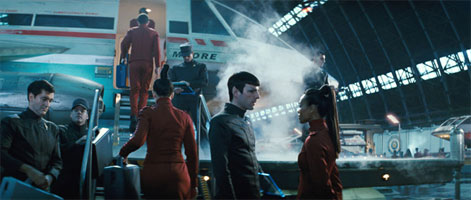 QUESTION: Did you get Greg Grunberg into this movie?
QUESTION: Did you get Greg Grunberg into this movie?JJ ABRAMS: You know, when Young Kirk is driving, his step-Dad calls him? Greg Grunberg.
QUESTION: Okay. What's up with the big red balls?
JJ ABRAMS: Excuse me?
QUESTION: Everything you do has a big red ball in it.
JJ ABRAMS: Not everything. There are a couple of shout outs to some of the stuff that we've worked on before and one of them is the big sort of Rambaldi ball from Alias, which was also a cameo.
QUESTION: And now we know what the ball is.
JJ ABRAMS: That's right. It was just a cameo.
QUESTION: I was really struck by how you incorporated a lot of iconic things about the characters and the show. Like, certain lines, and this and that. But you did it in a way that wasn't cheesy, or winking to the audience. How did you do that? And were you worried about putting in those lines, and making them seem natural?
JJ ABRAMS: Well, even as a non-fan - you know, "I'm giving her all she's got." You know, "Beam me up." There are certain lines that if I were to see a Star Trek movie and didn't see those things, I would feel like I was cheated, somehow. But the brilliance of Bob and Alex's script was that it didn't have those lines in scenes that would not have existed without those lines. Meaning, they were situations that were real, and urgent and specific, and necessary. And those lines organically came out of those moments. So that you had those kind of little peaks of recognition, but they were justified. And they were intrinsically connected to the scene. So you didn't ever feel like - oh, yeah. You know. That line. You know, they came out of the blue. They would surprise you. When I read the script, I thought, "This is genius." So, it's funny how - it was not - doing those lines was beside the point. And yet we all knew, "Yeah, yeah, yeah." A by-product of including those lines will be sort of that appreciation and nod to what people have - you know, fans of Trek have loved for years.
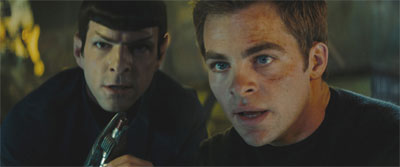 QUESTION: JJ, your movie really is a love letter to these characters, but you do make some pretty big change is the cannon, with the destruction of Vulcan. Do you think any of these characters are expendable? Also, if you were a kid in the back yard playing Star Trek, which one of these characters would you be?
QUESTION: JJ, your movie really is a love letter to these characters, but you do make some pretty big change is the cannon, with the destruction of Vulcan. Do you think any of these characters are expendable? Also, if you were a kid in the back yard playing Star Trek, which one of these characters would you be?JJ ABRAMS: Well, I think you're right. I mean, the movie is all about the characters, and is a love letter to the characters. And that's why I wanted to direct the movie. When I read the script, I just fell in love with it. And at the beginning of the process, if you'd said, you know, "Who is your favorite? Which one would you play?" I would say, "Well, probably none of them. I don't really connect to any of them." And now I'd say I couldn't choose one, because I love them all. You know, I never felt like I was Spock. I never felt like I was Kirk. I wasn't Bones, I wasn't Scottie, I wasn't Uhura, I wasn't Sulu. I wasn't any of them, really. Now I sort of feel like I love all of them, and I know all of them. I don't think any of them are expendable. I think that the genius of what Roddenberry created is that paradigm of all of these characters, you know? You've got the id, the ego, the superego. I mean, the group went obviously beyond just Kirk and Spock and Bones, with - this film especially, the end of the movie - you know, you realize that they wouldn't be there if all of them hadn't done their job. You know? Meaning that each one of them contributed in a critical way. And each one of them has put their lives into the other's hands. Not to say that if we were to do another film - who knows what the story would be. But I would say that in this one, I loved how each character was absolutely critical, and you got to know them in a way that, personally, I felt that I hadn't had a chance to do before.
QUESTION: How did you come to cast Tyler Perry in his role? That was interesting, to have him in this movie.
JJ ABRAMS: Tyler's someone who I've admired for years. I mean, not just in his abilities as a writer, director, and actor, but as an industry. I mean, this guy is amazing. And quite frankly, I've been jealous of him for a long time, because the work that he's done has been incredible. And we have people in common. And I just used those connections to reach to him, and send him an e-mail just to say, "Hey, it's JJ Abrams. Would you be interested in playing a role in this movie?" And he was intrigued. Never seen Star Trek before, so he didn't really know. And I kind of pushed it a little bit, and I sent him the script. And he said, "Yes." But he'd never seen Star Trek, still. And he did this part, and he'd never been on anybody else's set before. He's never acted in anybody else's movie. The way that he's created his business, his industry, his studio, and done his work, TV and film, is unbelievable to me. And I just - again, I'm just a fan. So, working with him was an honor, as it was working with Leonard Nimoy and Eric Bana, both of whom I'd also wanted to work with. And to be the first person that he collaborated with in this way was a thrill. And I was just telling - there was a - one day we were shooting one of his scenes, and he was doing his lines. And in the middle of it, he didn't like it. He said, "Cut." And he said, "Oh, sorry! So sorry." And he was just so used to doing his thing [LAUGHTER] - I love Tyler. And what was nice - the last thing about it. What was nice about it is that - and this has happened a few times - where there are actors or composers or writers, or - you know, directors, whose work you appreciate. Musicians, too. There's a weird thing, where you go, "I don't know that person. It's presumptuous, but I bet I'd get along with them." You know? And literally, on the set with him, it was like he was a brother. It's like, we had the same kind of references. It was the weirdest thing. And working with him just felt like it was - bless you. Felt like it was just one of those - you know. It couldn't have gone better, and I had high hopes for it. So - you know. I'm just a fan.
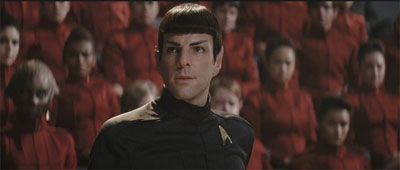 QUESTION: All of the actors today have demonstrated an amazing camaraderie with each other. And obviously it was apparent on set. It translated. There are a lot of funny moments on screen. Any funny moments on set that happened to kind of bond with the actors? Any practical jokes that went on, on the set?
QUESTION: All of the actors today have demonstrated an amazing camaraderie with each other. And obviously it was apparent on set. It translated. There are a lot of funny moments on screen. Any funny moments on set that happened to kind of bond with the actors? Any practical jokes that went on, on the set?JJ ABRAMS: I don't think there - I mean, look. The thing about this cast is - and, you know, we all saw a ton of actors. The key was that they all needed to have a sense of humor. It just was - I knew that was going to be the most important thing. Because if they were too serious - Star Trek already exists in that place. It's been parodied so many times. If it was too self-serious - and the original show had great wit. Like, the best things in some episodes of the original series was that amazing repartee between the characters. It was just too good. And so every single actor, including Eric Bana, including Bruce Greenwood and Mr. Nimoy, are funny. So, that was awesome. It wasn't awesome on one particular day, when we were shooting this one scene and they were all together. And it was one of those things where we just had no time. It was really late. It was just, we were way over schedule. We had all this work to do. The next day it was going to be a disaster. And it was one of those few scenes on the bridge where they were all together. Because a lot of times it's like, two actors here, three actors here. But it was one of those scenes. And they were just all in the mood to goof off. And the first AD, whose job it is to make sure that we make our day, and ride me so that we finish scenes, was looking at me like, "We're screwed." Like, "This is a disaster." And the actors were literally - they could not get through their lines without laughing. And by the way, on any other day I would have been like, "Hey, this is fun." No. This day was like - it was - and I remember, they were all goofing off, and I was trying to - you know, and I have three kids. So it's not a completely unusual situation, to try and wrangle. But I was trying to wrangle, and they were doing their thing. And finally, I was like, "When you guys are ready, come get me." And I just walked off. And I'm walking, and I'm thinking, "Wow, I just went and did it." [LAUGHTER] And I went back, and I got some water. And somebody was like, "Are you okay?" I'm like, "Yeah, I'm fine. We'll see what happens." And then they were all like, "Ooh, we've got to"-and then they came back and said, "Okay, they're ready to go." And I came back literally, like, three minutes later. And they were just like [SNAP]-and they were totally serious, and they did their scene. But it was the only time where their amazing sense of humor, camaraderie and sort of natural personalities was actually a pain in the ass. Other than that, it was awesome.
QUESTION: JJ, you seem to have a certain kind of creative restlessness, that you are sort of always moving from one idea to the next, or from one kind of storytelling to the next. Do you have a certain identified - either in retrospect, or as you go forward - do you have an identifiable or sort of conscious idea or concept that you are trying to explore? Or something that you especially like to bring to each new thing? Or is the difference in each of them the thing that appeals to you?
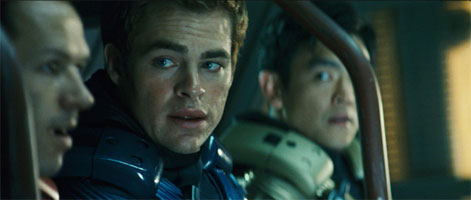 JJ ABRAMS: Personally, and obviously, I never think about stuff from the outside in, like that. So I have no idea what the hell I do. But I know that when there's something that interests me, it's undeniable, you know? I guess if I deconstruct things, I can sort of find connections. But then it feels sort of too mannered, or sort of self-aware. And I would hate to sort of be logical about why I'm approaching a project, or something. And to me, if there's an idea - literally, the idea of doing Star Trek, which is another sequel to a series of films basked on a television show that Leonard Nimoy starred in - you know, I'd done that with Mission Impossible. I didn't think, "Oh, I'm going to do another one of those." It just happened to be that when I read the script after we worked together for a while - and I just read it, I thought, "I will literally be so envious of whomever directs this movie." I just knew I'd go to the set and it would kill me. Not that they couldn't do it better, but that I'd just be frustrated that I didn't say yes to an opportunity to do it. But it wasn't an intellectual thing at all. It was actually counter-intellectual. It was an emotional thing. So the key for me - and I think the way that these guys work, too, is - when you work on something that you truly love, that is undeniable - even if it ends up not being any good, at least the ambition was right. But if you ever work on something, you think, "Oh, they will like this." I think you're in such dangerous territory. Because you have no idea what - you know, then it's false pretenses from the beginning, you know?
JJ ABRAMS: Personally, and obviously, I never think about stuff from the outside in, like that. So I have no idea what the hell I do. But I know that when there's something that interests me, it's undeniable, you know? I guess if I deconstruct things, I can sort of find connections. But then it feels sort of too mannered, or sort of self-aware. And I would hate to sort of be logical about why I'm approaching a project, or something. And to me, if there's an idea - literally, the idea of doing Star Trek, which is another sequel to a series of films basked on a television show that Leonard Nimoy starred in - you know, I'd done that with Mission Impossible. I didn't think, "Oh, I'm going to do another one of those." It just happened to be that when I read the script after we worked together for a while - and I just read it, I thought, "I will literally be so envious of whomever directs this movie." I just knew I'd go to the set and it would kill me. Not that they couldn't do it better, but that I'd just be frustrated that I didn't say yes to an opportunity to do it. But it wasn't an intellectual thing at all. It was actually counter-intellectual. It was an emotional thing. So the key for me - and I think the way that these guys work, too, is - when you work on something that you truly love, that is undeniable - even if it ends up not being any good, at least the ambition was right. But if you ever work on something, you think, "Oh, they will like this." I think you're in such dangerous territory. Because you have no idea what - you know, then it's false pretenses from the beginning, you know?QUESTION: I just want to ask you a little bit about the casting, because you didn't necessarily go with actors that looked exactly like the original actors that portray those characters. But, what were you looking for? Say, for Simon Pegg, portraying his character. And also, of course, Chris. Who doesn't look exactly like William Shatner, but he was able to kind of convey that swarthiness.
JJ ABRAMS: Right, right. Well, the only one that we needed to cast that really had to resemble was Zachary. Because he was playing the same character, and we knew there was going to be a scene with the two of them. And if they looked nothing alike, it would just be too distracting. The fact that Zachary is an eerie doppelganger didn't hurt. But that was sort of the only literal - look. The fact is, at a certain point, it's a movie. It's called Star Trek. And we knew that the audience needed to accept certain sort of artistic license. We had to be able to say to the audience, "Look, it's different actors playing these parts. It's not going to be"-you know, you have to just go with us. And what we always knew - not looking at this as a series of films at all, but we just knew that this movie was a bridge between the Trek that people know, and this new group that's starting this five-year mission. And so that, to me, was the critical thing. We needed to - as much as we could, assume the audience would go along with us on this ride. So the actors who played the other characters needed to embody them. They needed to sort of be inspired by what was created 43 years ago, and at the same time, own it. And the only way it would work is if they really owned it. And so although Zachary could walk on the set, and he wouldn't need to talk, and they'd be like, "That's Spock." And it got to a place where I literally would forget what the original Spock looked like a little bit. Because that was - it was a weird thing. I was like, "Oh, that's Spock." And then I'd see a picture of Nimoy and go, "Oh, I see." It was very strange. With the other characters, it was really about just finding great actors who could give - make those roles come alive. So, finding John Cho - I was a little worried at first. Because - okay, he's not of Japanese descent. But I thought, "This is ridiculous." It's like, he's right for the part. And I knew that we inherited these characters, so they had to - I knew that Uhura needed to be of African descent. But that didn't mean that she needed to be exactly like Nichelle Nichols. And in fact, that issue of relevance, we needed to - the master we needed to serve was, what makes it vital for now? And not try and do a skit, you know? So, it was - on every level, from the casting you're discussing, to the props, to the ship design, to the production design - everything was a choice. Filtering it through that. Like, "How do we make it work for now, even though it was inspired by a half-a-century-ago idea?"
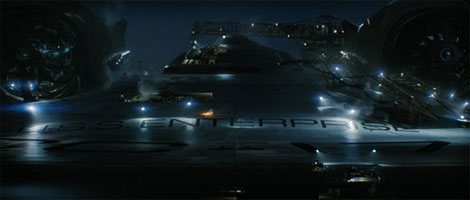 QUESTION: You had Majel Barrett-Roddenberry working on set for the last little while, didn't you?
QUESTION: You had Majel Barrett-Roddenberry working on set for the last little while, didn't you?JJ ABRAMS: Uh-huh [AFFIRM].
QUESTION: How was that? It was just before she died, wasn't it?
JJ ABRAMS: Yeah, it was. We were very lucky to have Majel come and do the voice for the Star Fleet computer, which she had done in the series and the films. She came to the set one day when we were shooting on the Narada, and she was just lovely. And she was elegant and funny and supportive. It was - it's that crazy thing. We were working with Nimoy, so we knew we had someone who had been there and was part of it. And Walter Konig visited the set, and that was great. And Nichelle visited the set. And we had had breakfast with George Takei. But to have Majel come, it was a different kind of thing. Because she was part of the behind-the-scenes of it, as well as being on camera. And to have her say to us that, "This is what"-basically she said that Gene would have approved what we were doing. And that meant more than I can say. And we always knew we were dedicating the movie to Gene Roddenberry, because we never would have, obviously, been doing any of this if it weren't for him. But sadly, when Majel passed away, we added her name to the card at the end.
QUESTION: Was there any discussion at all about bringing Shatner into this? Was there an early draft of William Shatner?
JJ ABRAMS: Sure. Oh, sure. We had a scene with him in it, that they wrote. And it was sort of a flashback-y thing. But Bill made it clear he didn't want to just do a cameo. So we ended up realizing we'd have to change the whole story to bring him back to life - we just had to bite the bullet and say, "It's going to be Nimoy, and not Shatney." We would have loved to work with him.
QUESTION: Would you like to direct the series finale of Lost?
JJ ABRAMS: I would love to., but Jack Bender's been directing the whole series, the producing director. And I wouldn't presume to take that away from him. I mean, he was the director. I would love to do it, selfishly. But.
QUESTION: What's next for you?
JJ ABRAMS: We're producing a movie, and it starts shooting next month in New York, and I'm working on a script for something, so we'll see if it works out.
QUESTION: Karl Urban. How did you know if he would be able to do McCoy?
JJ ABRAMS: I didn't. I actually thought he wouldn't. I thought, "This is a waste of everyone's time." Because he's the stud from The Lord of the Rings, and he's that bad guy from Bourne? It's like, come on. Could not be less Bones. He walked in, and was Bones. It was insane.
QUESTION: Did he campaign for it, or was it just a casting director's idea?
JJ ABRAMS: He walked in, and just started being Bones. It was like - the last thing I ever thought was going to happen. He channeled the character in a way that, he left, and it was just like, there was never anyone else to play that part.
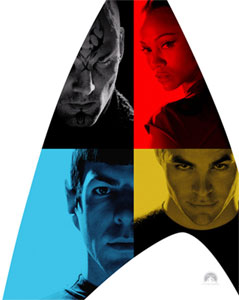
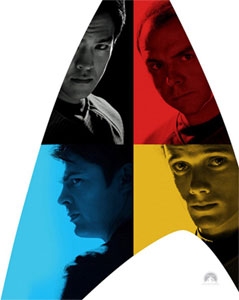
Star Trek
Starring: Chris Pine, Zachary Quinto, Karl Urban, Simon Pegg, Eric Bana, Anton Yelchin, Zoe Saldana, John Cho, Leonard Nimoy, Bruce Greenwood, Ben Cross, Winona RyderDirector: J.J. Abrams
Genre: Science-Fiction/Fantasy
Rated: M
The greatest adventure of all time begins with Star Trek, the incredible story of a young crews maiden voyage onboard the most advanced starship ever created: the U.S.S. Enterprise. On a journey... The greatest adventure of all time begins with Star Trek, the incredible story of a young crews maiden voyage onboard the most advanced starship ever created: the U.S.S. Enterprise. On a journey filled with action, comedy and cosmic peril, the new recruits must find a way to stop an evil being whose mission of vengeance threatens all of mankind.
The fate of the galaxy rests in the hands of bitter rivals. One, James T. Kirk (Chris Pine), is a delinquent, thrill-seeking Iowa farm boy. The other, Spock (Zachary Quinto), was raised in a logic-based society that rejects all emotion. As fiery instinct clashes with calm reason, their unlikely but powerful partnership is the only thing capable of leading their crew through unimaginable danger, boldly going where no one has gone before!
MORE
- Viggo Mortensen The Road
- 24 Cast Reunion
- Aaron Eckhardt No Reservations
- Aaron Eckhart The Dark Knight
- Adam McKay Step Brothers Interview
- Alan Alda Diminished Capacity Interview
- Alan Alda Diminished Capacity Interview
- Alex Dimitriades
- Al Pacino Oceans 13
- Alan Rickman Snow Cake
- Alan Rickman Sweeney Todd



